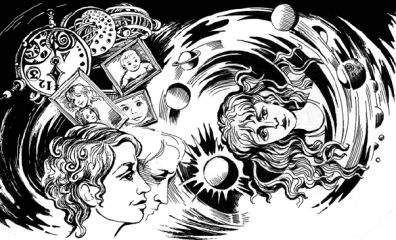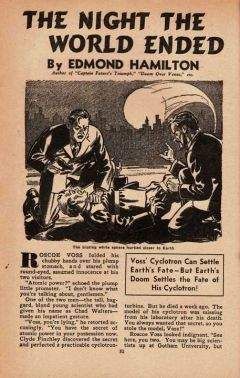Somerset Maugham - Sixty-Five Short Stories

Скачивание начинается... Если скачивание не началось автоматически, пожалуйста нажмите на эту ссылку.
Жалоба
Напишите нам, и мы в срочном порядке примем меры.
Описание книги "Sixty-Five Short Stories"
Описание и краткое содержание "Sixty-Five Short Stories" читать бесплатно онлайн.
'Come right along.'
I accompanied him to his bedroom, where Giuseppe, the waiter, was making his bed. The first thing I caught sight of was a photograph in a gorgeous frame of the celebrated Mrs Barnaby. My friend caught sight of it too and suddenly turned pale with anger.
'You fool, Giuseppe. Why have you taken that photograph out of my wardrobe? Why the devil did you think I put it away?'
'I didn't know, Signore. That's why I put it back on the Signore's table. I thought he liked to see the portrait of hissignora.'
I was staggered.
'Is my Mrs Barnaby your wife?' I cried.
'She is.'
'Good Lord, are you One-Bullet Mike?'
'Do I look it?'
I began to laugh.
'I'm bound to say you don't.'
I glanced at his hands. He smiled grimly and held them out.
'No, sir. I have never felled a steer with my naked fist.'
For a moment we stared at one another in silence.
'She'll never forgive me,' he moaned. 'She wanted me to take a false name, and when I wouldn't she was quite vexed with me. She said it wasn't safe. I said it was bad enough to hide myself in Positano for three months, but I'd be damned if I'd use any other name than my own.' He hesitated. 'I throw myself on your mercy. I can do nothing but trust to your generosity not to disclose a secret that you have discovered by the most unlikely chance.'
'I will be as silent as the grave, but honestly I don't understand. What does it all mean?'
'I am a doctor by profession and for the last thirty years my wife and I have lived in Pennsylvania. I don't know if I have struck you as a roughneck, but I venture to say that Mrs Barnaby is one of the most cultivated women I have ever known. Then a cousin of hers died and left her a very large fortune. There's no mistake about that. My wife is a very, very rich woman. She has always read a great deal of English fiction and her one desire was to have a London season and entertain and do all the grand things she had read about in books. It was her money and although the prospect did not particularly tempt me, I was very glad that she should gratify her wish. We sailed last April. The young Duke and Duchess of Hereford happened to be on board.'
'I know. It was they who first launched Mrs Barnaby. They were crazy about her. They've boomed her like an army of press-agents.'
'I was ill when we sailed, I had a carbuncle which confined me to my stateroom, and Mrs Barnaby was left to look after herself. Her deck-chair happened to be next the duchess's, and from a remark she overheard it occurred to her that the English aristocracy were not so wrapped up in our social leaders as one might have expected. My wife is a quick little woman and she remarked to me that if you had an ancestor who signed Magna Carta perhaps you were not excessively impressed because the grandfather of one of your acquaintances sold skunks and the grandfather of another ran ferryboats. My wife has a very keen sense of humour. Getting into conversation with the duchess, she told her a little Western anecdote, and to make it more interesting told it as having happened to herself. Its success was immediate. The duchess begged for another and my wife ventured a little further. Twenty-four hours later she had the duke and duchess eating out of her hand. She used to come down to my stateroom at intervals and tell me of her progress. In the innocence of my heart, I was tickled to death and since I had nothing else to do, I sent to the library for the works of Bret Harte and primed her with effective touches.'
I slapped my forehead.
'We said she was as good as Bret Harte,' I cried.
'I had a grand time thinking of the consternation of my wife's friends when at the end of the voyage I appeared and we told them the truth. But I reckoned without my wife. The day before we reached Southampton Mrs Barnaby told me that the Herefords were arranging parties for her. The duchess was crazy to introduce her to all sorts of wonderful people. It was a chance in a thousand; but of course I should spoil everything, she admitted that she had been forced by the course of events to represent me as very different from what I was. I did not know that she had already transformed me into One-Bullet Mike, but I had a shrewd suspicion that she had forgotten to mention that I was on board. Well, to make a long story short, she asked me to go to Paris for a week or two till she had consolidated her position. I didn't mind that. I was much more inclined to do a little work at the Sorbonne than to go to parties in Mayfair, and so leaving her to go on to Southampton, I got off at Cherbourg. But when I had been in Paris ten days she flew over to see me. She told me that her success had exceeded her wildest dreams: it was ten times more wonderful than any of the novels; but my appearance would ruin it all. Very well, I said, I would stay in Paris. She didn't like the idea of that; she said she'd never have a moment's peace so long as I was so near and I might run across someone who knew me. I suggested Vienna or Rome. They wouldn't do either, and at last I came here and here have I been hiding like a criminal for three interminable months.'
'Do you mean to say you never killed the two gamblers, shooting one with your right hand and the other with your left?'
'Sir, I have never fired a pistol in my life.'
'And what about the attack on your log-cabin by the Mexican bandits when your wife loaded your guns for you and you stood the siege for three days till the Federal troops rescued you?'
Mr Barnaby smiled grimly.
'I never heard that one. Isn't it a trifle crude?'
'Crude! It was as good as any Wild West picture.'
'If I may venture a guess, that is where my wife in all probability got the idea.'
'But the wash-tub. Washing the miners' clothes and all that. You don't know how she made us roar with that story. Why, she swam into London Society in her wash-tub.'
I began to laugh.
'She's made the most gorgeous fools of us all,' I said.
'She's made a pretty considerable fool of me, I would have you observe,' remarked Mr Barnaby.
'She's a marvellous woman and you're right to be proud of her. I always said she was priceless. She realized the passion for romance that beats in every British heart and she's given us exactly what we wanted. I wouldn't betray her for worlds.'
'It's all very fine for you, sir. London may have gained a wonderful hostess, but I'm beginning to think that I have lost a perfectly good wife.'
'The only place for One-Bullet Mike is the great open West. My dear Mr Barnaby, there is only one course open to you now. You must continue to disappear.'
'I'm very much obliged to you.'
I thought he replied with a good deal of acidity.
A Man with a Conscience
St Laurent de Maroni is a pretty little place. It is neat and clean. It has an Hotel de Ville and a Palais de Justice of which many a town in France would be proud. The streets are wide, and the fine trees that border them give a grateful shade. The houses look as though they had just had a coat of paint. Many of them nestle in little gardens, and in the gardens are palm trees and flame of the forest; cannas flaunt their bright colours and crotons their variety; the bougainvillaeas, purple or red, riot profusely, and the elegant hibiscus offers its gorgeous flowers with a negligence that seems almost affected. St Laurent de Maroni is the centre of the French penal settlements of Guiana, and a hundred yards from the quay at which you land is the great gateway of the prison camp. These pretty little houses in their tropical gardens are the residence of the prison officials, and if the streets are neat and clean it is because there is no lack of convicts to keep them so. One day, walking with a casual acquaintance, I came upon a young man, in the round straw hat and the pink and white stripes of the convict's uniform, who was standing by the road-side with a pick. He was doing nothing.
'Why are you idling?' my companion asked him.
The man gave his shoulders a scornful shrug.
'Look at the blade of grass there,' he answered. 'I've got twenty years to scratch it away.'
St Laurent de Maroni exists for the group of prison camps of which it is the centre. Such trade as it has depends on them; its shops, kept by Chinese, are there to satisfy the wants of the warders, the doctors, and the numerous officials who are connected with the penal settlements. The streets are silent and deserted. You pass a convict with a dispatch-case under his arm; he has some job in the administration; or another with a basket; he is a servant in somebody's house. Sometimes you come upon a little group in the charge of a warder; often you see them strolling to or from the prison unguarded. The prison gates are open all day long and the prisoners freely saunter in and out. If you see a man not in the prison uniform he is probably a freed man who is condemned to spend a number of years in the colony and who, unable to get work, living on the edge of starvation, is drinking himself to death on the cheap strong rum which is called tafia.
There is an hotel at St Laurent de-Maroni and here I had my meals. I soon got to know by sight the habitual frequenters. They came in and sat each at his little table, ate their meals in silence, and went out again. The hotel was kept by a coloured woman, and the man she lived with, an ex-convict, was the only waiter. But the Governor of the colony, who lives at Cayenne, had put at my disposal his own bungalow and it was there I slept. An old Arab looked after it; he was a devout Mahommedan, and at intervals during the day I heard him say his prayers. To make my bed, keep my rooms tidy, and run errands for me, the commandant of the prison had assigned me another convict. Both were serving life sentences for murder; the commandant told me that I could place entire confidence in them; they were as honest as the day, and I could leave anything about without the slightest risk. But I will not conceal from the reader that when I went to bed at night I took the precaution to lock my door and to bolt my shutters. It was foolish no doubt, but I slept more comfortably.
I had come with letters of introduction, and both the governor of the prison settlements and the commandant of the camp at St Laurent did everything they could to make my visit agreeable and instructive. I will not here narrate all I heard and saw. I am not a reporter. It is not my business to attack or to defend the system which the French have thought fit to adopt in regard to their criminals. Besides, the system is now condemned; prisoners will soon cease to be sent out to French Guiana, to suffer the illnesses incidental to the climate and the work in malarial jungles to which so many are relegated, to endure nameless degradations, to lose hope, to rot, to die. I will only say that I saw no physical cruelty. On the other hand I saw no attempt to make the criminal on the expiration of his sentence a useful citizen. I saw nothing done for his spiritual welfare. I heard nothing of classes that he could attend in order to improve his education or organized games that might distract his mind. I saw no library where he could get books to read when his day's work was done. I saw a condition of affairs that only the strongest character could hope to surmount. I saw a brutishness that must reduce all but a very few to apathy and despair.
All this has nothing to do with me. It is vain to torment oneself over sufferings that one cannot alleviate. My object here is to tell a story. As I am well aware, one can never know everything there is to be known about human nature. One can be sure only of one thing, and that is that it will never cease to have a surprise in store for you. When I had got over the impression of bewilderment, surprise, and horror to which my first visit to the prison camp gave rise, I bethought myself that there were certain matters that I was interested to inquire into. I should inform the reader that three-quarters of the convicts at St Laurent de Maroni are there for murder. This is not official information and it may be that I exaggerate; every prisoner has a little book in which are set down his crime, his sentence, his punishments, and whatever else the authorities think necessary to keep note of; and it was from an examination of a considerable number of these that I formed my estimate. It gave me something of a shock to realize that in England far, far the greater number of these men whom I saw working in shops, lounging about the verandas of their dormitories, or sauntering through the streets would have suffered capital punishment. I found them not at all disinclined to speak of the crime for which they had been convicted, and in pursuance of my purpose I spent the better part of one day inquiring into crimes of passion. I wanted to know exactly what was the motive that had made a man kill his wife or his girl. I had a notion that jealousy and wounded honour might not perhaps tell the whole story. I got some curious replies, and among them one that was not to my mind lacking in humour. This was from a man working in the carpenter's shop who had cut his wife's throat; when I asked him why he had done it, he answered with a shrug of the shoulders: Manque d'entente. His casual tone made the best translation of this: We didn't get on very well. I could not help observing that if men in general looked upon this as an adequate reason for murdering their wives, the mortality in the female sex would be alarming. But after putting a good many questions to a good many men I arrived at the conclusion that at the bottom of nearly all these crimes was an economic motive; they had killed their wives or mistresses not only from jealousy, because they were unfaithful to them, but also because somehow it affected their pockets. A woman's infidelity was sometimes an occasion of financial loss, and it was this in the end that drove a man to his desperate act; or, himself in need of money to gratify other passions, he murdered because his victim was an obstacle to his exclusive possession of it. I do not conclude that a man never kills his woman because his love is spurned or his honour tarnished, I only offer my observation on these particular cases as a curious sidelight on human nature. I should not venture to deduce from it a general rule.
I spent another day inquiring into the matter of conscience. Moralists have sought to persuade us that it is one of the most powerful agents in human behaviour. Now that reason and pity have agreed to regard hell-fire as a hateful myth, many good men have seen in conscience the chief safeguard that shall induce the human race to walk in the way of righteousness. Shakespeare has told us that it makes cowards of us all. Novelists and playwrights have described for us the pangs that assail the wicked; they have vividly pictured the anguish of a stricken conscience and the sleepless nights it occasions; they have shown it poisoning every pleasure till life is so intolerable that discovery and punishment come as a welcome relief. I had often wondered how much of all this was true. Moralists have an axe to grind; they must draw a moral. They think that if they say a thing often enough people will believe it. They are apt to state that a thing is so when they consider it desirable that it should be. They tell us that the wages of sin is death; we know very well that it is not always. And so far as the authors of fiction are concerned, the playwrights and the novelists, when they get hold of an effective theme they are disposed to make use of it without bothering very much whether it agrees with the facts of life. Certain statements about human nature become, as it were, common property, and so are accepted as self-evident. In the same way painters for ages painted shadows black, and it was not till the impressionists looked at them with unprejudiced eyes and painted what they saw that we discovered that shadows were coloured. It had sometimes struck me that perhaps conscience was the expression of a high moral development, so that its influence was strong only in those whose virtue was so shining that they were unlikely to commit any action for which they could seriously reproach themselves. It is generally accepted that murder is a shocking crime, and it is the murderer above all other criminals who is supposed to suffer remorse. His victim, we have been led to believe, haunts his dreams in horrifying nightmares, and the recollection of his dreadful deed tortures his waking hours. I could not miss the opportunity to inquire into the truth of this. I had no intention of insisting if I encountered reticence or distress, but I found in none of those with whom I talked any such thing. Some said that in the same circumstances they would do as they had done before. Determinists without knowing it, they seemed to look upon their action as ordained by a fate over which they had no control. Some appeared to think that their crime was committed by someone with whom they had no connexion.
Подписывайтесь на наши страницы в социальных сетях.
Будьте в курсе последних книжных новинок, комментируйте, обсуждайте. Мы ждём Вас!
Похожие книги на "Sixty-Five Short Stories"
Книги похожие на "Sixty-Five Short Stories" читать онлайн или скачать бесплатно полные версии.
Мы рекомендуем Вам зарегистрироваться либо войти на сайт под своим именем.
Отзывы о "Somerset Maugham - Sixty-Five Short Stories"
Отзывы читателей о книге "Sixty-Five Short Stories", комментарии и мнения людей о произведении.














